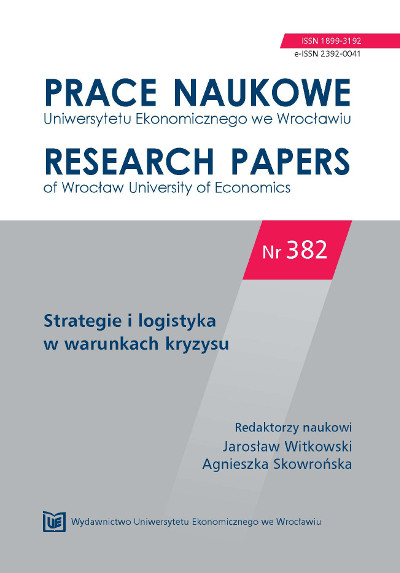Rola kart okresowej oceny dostawców w budowaniu relacji na rynku B2B - analiza porównawcza zmian w czasie na przykładzie przedsiębiorstwa produkcyjneg
Role of suppliers scorecards in building relationships in the B2B market - comparative analysis of changes in time on the example of a production comp
Author(s): Izabella SzudrowiczSubject(s): Economy
Published by: Wydawnictwo Uniwersytetu Ekonomicznego we Wrocławiu
Keywords: supplier−recipient relationships; collaboration in the supply chain; B2B market
Summary/Abstract: A relationship between a supplier and a recipient on the enterprise market is gaining importance especially under conditions of intensity growth of competition that characterizes the current economy. The change in strategy with respect to suppliers is most likely caused not only by the pressure of a turbulent environment, but also more and more conscious desire to continuously improve the organization’s operations. Functioning to reduce costs and improve the quality of customer service is a crucial priority for many companies. The aim of the study was to present the changes that occurred in recent years in the construction of suppliers scorecards and to identify the causes of the occurrence of these changes. The analysis was based on the documentation of the average manufacturing company located in the Łódź Voivodeship. The paper presents a comparison of three versions (from the years 2010, 2012 and 2014) of the modern relationship management tools, which is the periodic assessment card. The work raises issues shaping cooperation between the directly related companies in the supply chain and outlines a broader background for this issue. The analysis of changes in each version of the document facilitates inference about relative priorities of cooperation in the supply chain on B2B market. The area of relations between contractors seems to be not only topical, but also important from the point of view of strategy formulation and logistics management. The diagnosis of practical aspects observed directly in companies, may constitute an important contribution to the development of theoretical elements of knowledge in the field of logistics.
Journal: Prace Naukowe Uniwersytetu Ekonomicznego we Wrocławiu
- Issue Year: 2015
- Issue No: 382
- Page Range: 105-116
- Page Count: 12

